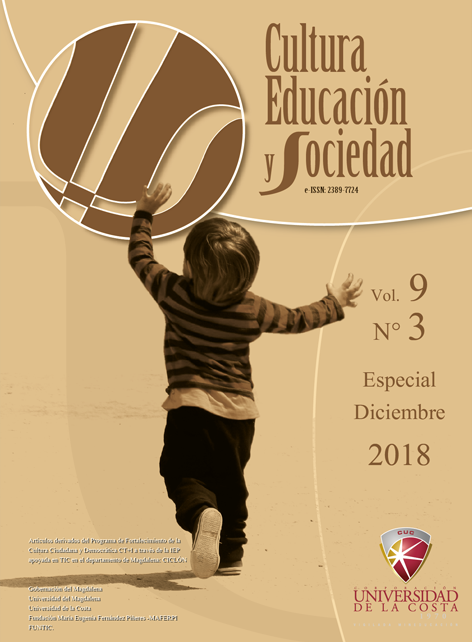Research as a pedagogical strategy for teaching-learning the organic garden at school
DOI:
https://doi.org/10.17981/cultedusoc.9.3.2018.66Keywords:
Research as IEP Pedagogical Strategy, ICT Information and Communication Technologies, organic gardens.Abstract
This article shows results of the Research as a Pedagogical Strategy (IEP) because it is a valuable tool that allows making a significant contribution to the construction of knowledge, because in an autonomous way the student discovers new experiences through questions. they will allow you to transform the way you perceive the world. Taking into account the above, the IEP is taken as a strategy to develop this project with the theme of organic gardens, encouraging students in this traditional practice in the village of Loma del Bálsamo, Magdalena, which will contribute its comprehensive training from a research line. The objective is to use the IEP as a pedagogical strategy in the use of organic gardens in the school, in which the population was made up of students from the Departmental Educational Institution of Loma del Bálsamo, Magdalena, where individual reports were used to collect the data. , institutional and field journals.
Downloads
References
Báez y Pérez de Tudela, J. (2009). Investigación cualitativa. Madrid, España: ESIC Editorial.
Bernal, C. (2011). Metodología de la investigación. Pearson Educación de México, S.A. de C.V.
Cacurri, V. (2013). Revista Educación con TIC, nuevas formas de enseñar en la era digital. Buenos Aires
Escrivá, M. (2007). Huerta orgánica. Buenos Aires: Albatros.
García, A. (2015). Los beneficios de la Tecnología en la Educación | Artículos. Labrechadigital.org. Retrieved from http://www.labrechadigital.org/labrecha/Articulos/los-beneficios-de-la-tecnologia-en-la-educacion.html
González, J., Moreno, L. A., & Rodríguez, M. (2015). La integración y sus convenios internacionales en América Latina. Económicas CUC, 36(2), 79-94.
Hernández,, R.; Fernández, C. y Baptista,P. (2014). Metodología de la investigación. México, D.F.: McGraw-Hill Education.
Mejía Jiménez,, M., y Manjarrés, M. (2011). La investigación como estrategia pedagógica una apuesta por construir pedagogías críticas en el siglo xxi. Praxis & Saber, 2(4), 127. http://dx.doi.org/10.19053/22160159.1127
Mendoza, D. L., & López, D. D. (2015). Pensamiento estratégico: centro neurálgico de la planificación estratégica que transforma la visión en acción. Económicas CUC, 36(1), 153-179.
Olguin, S. (2011). Qué es una huerta orgánica. Innatia.com. Retrieved from http://www.innatia.com/s/c-huerta-organica/a-que-es-huerta-organica.html
Orozco, M. (2015). Métodos, formas, procedimientos y sistemas de enseñanza en una concepción de la pedagogía como arte según José M. Zamora. Aula, 21(0), 165. http://dx.doi.org/10.14201/aula201521165176
Pacheco, C. M. (2013). Estrategias empresariales más utilizadas por las pymes en Sincelejo. Económicas CUC, 34(1), 183-202.
Pérez Serrano, G. (2002). Investigación cualitativa. Retos e interrogantes. II técnicas y análisis de datos. Madrid: la Muralla S.A.
Restrepo, B. (2009). Investigación de aula: formas y actores. Bibliotecadigital.udea.edu.co. Retrieved from http://bibliotecadigital.udea.edu.co/bitstream/10495/3498/1/RestrepoBernardo_2009_Investigaci%C3%B3naulasformas.pdf
Strack, J., Suárez, J., Di Mauro, G., & Jacob, S. (2014). Impacto de la iluminación residencial eficiente en la calidad de la energía de una red de distribución. INGE CUC, 10(2), 9 - 19. Recuperado a partir de https://revistascientificas.cuc.edu.co/index.php/ingecuc/article/view/485
Schutter, A. (1987). Metodo y proceso de la investigación participativa en la capacitación rural. Patzcuaro, Michoacan: CREFAL.
Stojanov, E. (2003). Huerta orgánica. Buenos Aires, Argentina: Reysa Ediciones.
Villalba, A. (2012). Dos paradigmas contrapuestos en la evaluación educativa, dos formas diferentes de concebir al alumno. Aula Universitaria, 1(14). http://dx.doi.org/10.14409/au.v1i14.4123
Downloads
Published
How to Cite
Issue
Section
License
Copyright (c) 2018 CULTURA EDUCACIÓN Y SOCIEDAD

This work is licensed under a Creative Commons Attribution-NonCommercial-NoDerivatives 4.0 International License.
![]()
Creative Commons 2020 CULTURA EDUCACIÓN Y SOCIEDAD
This article is under international license Creative Commons Reconocimiento-NoComercial-SinObrasDerivadas 4.0.
The published articles are the sole responsibility of their authors and do not necessarily reflect the opinions of the editorial committee.
CULTURA EDUCACIÓN Y SOCIEDAD respects the moral rights of its authors, who assign to the editorial committee the patrimonial rights of the published material. In turn, the authors inform that this work is unpublished and has not been previously published.
All articles are under a:
Licencia Creative Commons Atribución-NoComercial-SinDerivadas 4.0 Internacional.
![]()


 English
English
 Español (España)
Español (España)




_12.53_.27_p_. m_._3.png)





_12.57_.35_p_. m_._3.png)
_12.50_.37_p_. m_._3.png)



